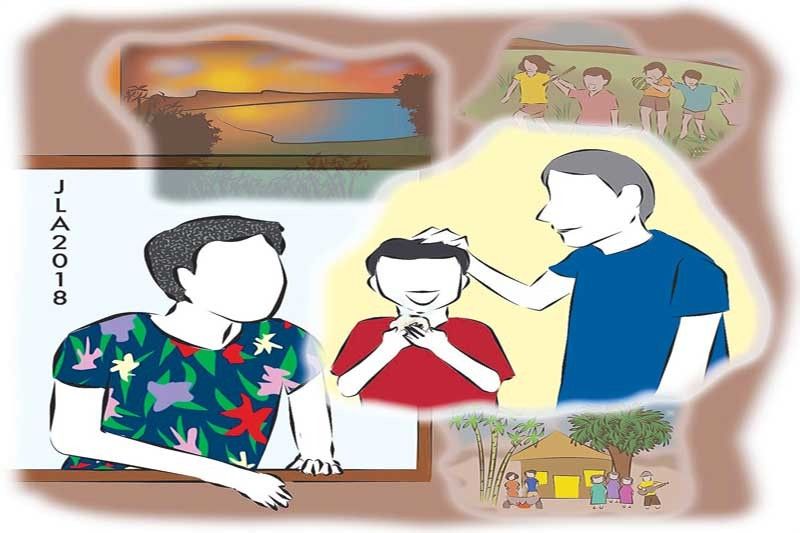Memories of our old house

I become most reflective about my life during the week of my birthday. I recently turned 47 and in the course of my self-examination, I was reacquainted with my six-year-old self, in our old house.
When the cheery cicadas started their cacophony, that signaled the time of the day in Gulod, 5:30 p.m. Even in summer, Gulod was cool and breezy after sundown. The singing cicadas were the first signal that wherever we were in the neighborhood, my brothers and I should hurry back home. If it took us longer than the usual, a series of whistles by my father would be heard anywhere we were. He whistled by putting his pinky and index fingers inside his mouth. One long whistle meant my father was calling my eldest brother Ronnie. Two long whistles were for my Kuya Gaddie. One short and one long whistle were for me. Three short whistles were for Odick. No whistle code for Rod because he was still a baby.
When we heard our respective whistle codes, I would abandon my jackstone playmates in a jiffy, even if I was already leading in the exhibition game. My two elder brothers would stop playing patintero or tumbang preso. Odick would leave his team in sikyo, a game of stylized hide-and-seek.
Almost all the fathers in the neighborhood whistled but we could distinguish which were the sounds coming from our father. Failure to come home at once meant a stern warning. Strike two and an ipil-ipil stick would land on our butt.
Home for us was a small house made of mainly lawanit and some palo china. It was surrounded by buboy (local cotton trees), ipil-ipil, chesa and buli palms. Our humble dwelling was supported by four short wooden pillars strong enough to make the house stand three inches from the ground. To enter the house, we needed to navigate narrow stairs with three steps, which, according to some old folk in the neighborhood, were unlucky. Oro, plata, mata. The stairs should stop in oro, which means gold, the symbol of prosperity.
At sundown, dinner was served. We washed our feet and hands before we entered the house. Inside, we ate on the bamboo slats that served also as the flooring of the house. The aroma of freshly cooked rice was enough to invite us to partake of dinner, even if all we shared that night was scrambled egg from an inahen (mother hen) roosting in a nest right under the bamboo slats. We slept soundly every night, the cicadas still humming, the kerosene lamp flickering above us. The little holes in the wall allowed me to see the stars outside. I dreamed while I was still awake. I would like to reach the stars one day.
Then I would slip myself into a jute sack to protect me from the cold breeze seeping through the house. I continued to dream in my sleep.
One summer night, when my father had extra money, he bought siopao for all of us. One siopao asado or siopao mongo was 50 centavos. I knew what siopao was because I would always hear the ambulant vendor peddling it in his pedicab in the neighborhood. I knew how it smelled, the sweet-savory aroma of it wafted in the unpolluted air of Gulod, mixing with the scent of kerosene coming from the lamp used by the vendor to guide him on the rough road of the barrio. But I did not know how siopao tasted until that night.
Excitedly, our father rose us from the boon of our sleep. In the barrio, that time, people slept at 6 p.m. or even earlier. He distributed the siopao one by one to his children. When I got mine, I thought it was a slipper that I used in bonggoy (a game of throwing a slipper using the feet). Half awake, I put the bun on top of my feet, made a high jump that thwarted the siopao to the wall. Everybody laughed at me. When I gathered my wits, I realized it was siopao mongo. I savored it. It was the first time. I relished every bite. And dreamed that I would have it again in the future.
It took a long time for me to have a bite of siopao again. But the ambulant vendor in the neighborhood always gave me an assurance that I would one day get my wish of eating siopao again.
To this day, I associate siopao with happiness and abundance. Aside from love, hardship and fortitude that I learned from home, I always associate our old house with that happy memory of a siopao.
The whistling is not heard anymore. But I still hear my father — his voice, his wisdom. The holes in the wall are gone. But I still look at the stars and dream. The bamboo slats are now concrete. But I always keep my feet on the ground.
And every now and then, I have a hankering for a siopao.
* * *
(For your new beginnings, e-mail me at bumbaki@yahoo.com. I am also on Twitter @bum_tenorio and Instagram @bumtenrio. Have a blessed Sunday.)















